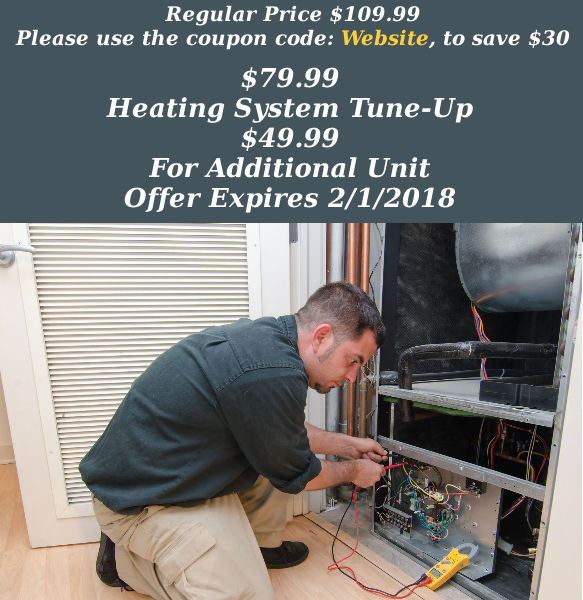As a Charlotte NC heating and cooling company we get a lot of very good questions from our customers about their furnaces, air conditioners, water heaters and you name it! One question we get repeatedly that I would like to address is: “Do I really need to have my heating and cooling system maintained or tuned-up?”
Most people would like to think about their heating system as little as possible – especially when it comes to preventative maintenance. In the past, maintaining a furnace has ranked very low on peoples “important things to do list”, but putting off maintenance is not a good idea. If you really want to think about your heating and cooing system as little as possible, then you need to keep it cleaned and maintained. Here is some information about maintenance that may help you rearranged your to do list, and helped you sleep a bit easier at night.
If you really want to think about your furnace as little as possible then preventative maintenance, by way of a fall tune-up or a PMA (Planned Maintenance Agreement) with a reputable HVAC professional, is the only way to go.
What if you were shopping for a car. You find a 1 year old car with 50,000 miles on the odometer and learn that the car has NEVER had the oil changed? Would you buy it?
Most HVAC professionals would equate preventative maintenance for your heating and cooling system to be equally as important as regular oil changes for your vehicle! Much like your vehicle, your heating and cooing system is a mechanical system with moving parts and pieces that need to be cleaned, inspected and adjusted. Sure, you don’t have spark plugs in your furnace like you do your vehicle, but you do have things like: valves, pumps, motors, belts etc… Just like your vehicle, all of these parts and pieces will wear out with use and age!
So, what exactly are you paying for when it comes to a tune-up or maintenance visit for your furnace? Here is a general list of things your HVAC professional is expected to do during a tune-up or fall maintenance. This list may vary from contractor to contractor, but in general you should make sure that whomever you hire is doing the following things:
1. Check furnace or boiler for the presence of CO at the time the check is performed
2. Check combustion chamber/heat exchanger condition
3. Check burner flame for proper characteristics including gas and air adjustment; clean burner, as necessary
4. Check pilot/igniter operation; clean pilot as necessary
5. Check motors, oil as needed (oil pump if boiler); check belts
6. Check condition of vent pipe to chimney and draft intensity
7. Remove dust and scale from the burner compartment and other key parts as needed
8. Check flame sensor or pilot safety timing and replace thermocouple, as necessary
9. Check condition of blower wheel
10. Check furnace filters
11. Restart furnace or boiler
12. Check operational control sequence, including safety controls and thermostat
Now that we are on the same page about maintenance, here are some more benefits of preventative maintenance:
* Validates your current warranty and/or extended warranty. Some manufacturer and extended warranties can become voided or deny coverage if the equipment is not regularly maintained by a licensed HVAC professional.
* Increases the health and safety of those living in your home. Your furnace is a fossil fuel burning piece of equipment. When fossil fuels, such as natural gas, propane or oil are burned they omit combustion gases. These omissions contain harmful gases like: carbon monoxide, methane, VOC’s and small amounts of sulfur dioxide (very cursive). Your furnace is designed to properly exhaust these gases outside and NOT in your home. Unfortunately this design can become compromised, like for instance when your furnace has a cracked heat exchanger. A small crack in the heat exchanger will allow harmful combustion gases to leak out of the equipment and into the home. Inspecting the heat exchanger is one of many diagnostics tests performed during your tune-up.
IMPORTANT NOTE: all homes with fossil fuel appliances should have an updated and active CO detector located on each floor.
* Greatly decrease the chance of a break down. Systems tend to break when they are working the hardest. An example would be: a major holiday when you are hosting a house full of people. When doors are opening and closing on a cold day your furnace has to work harder to maintain the indoor temperature. This increase in run time enhances the probability for system failure. According to Louisiana Cooperative Extension Service, 9 out of 10 heating and cooling system failure as a result of dirt and/or dust.
* Increases the longevity of your system. According to Department of Energy, “proper maintenance extends the life of your furnace or boiler and saves you money”. The longer you can keep your system running at optimum performance, the more money you keep in your pocket! FYI: The average furnace replacement can range from $3,000.00 – $10,000.00! **price varies greatly depending on size of home, efficiency and location.
* Keeps your energy cost down. According to Energy Star.gov 46% of the cost for the average 3,000 sq. ft. single-family home’s utility bill derives from it’s heating and cooling system. Keeping your equipment maintained keeps your equipment running at its optimum capacity and therefore prevents a spike or increase to your utility bill that a poorly running HVAC system may cause.
Well, I hope this information has helped bring to light the importance of maintenance! For more information on who to call when you are choosing a Charlotte heating and cooling professional call us directly at (704) 622-3177.




